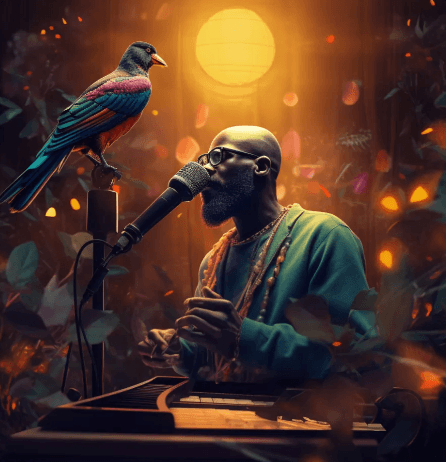Introduction
The music industry is undergoing a tech transformation, and at the heart of this change is the concept of artists' voices being licensed for AI-generated music. This development doesn't just highlight technological advancements; it also raises questions related to ethics, legal rights, and artistic integrity.
From startups like MyVox to tech giants such as Google teaming up with Universal Music, the field is set for a significant shift in creativity, ownership, and intellectual property. We'll explore how voice licensing is not only a technological phenomenon but also a cultural shift impacting our very experience of music.
AI in Music: The Evolution Continues
AI's involvement in music is not a new trend. What started with algorithms creating playlists and assisting compositions has evolved into AI creating independent music tracks. The game changed when AI began synthesizing voices, replicating human-like nuances and emotions.
This technology doesn't just create digital echoes of existing tracks; it can generate new content, fundamentally changing our understanding of music creation and ownership, and redefining what it means to be a musician in the digital era.
Uberduck emerged as a fascinating tool in the AI domain, offering users the ability to craft speech in celebrity voices, leading to a surge in popularity among content creators and tech enthusiasts. However, its ascent met a stumbling block as concerns over deepfake technology, user privacy, and potential misuse for creating misleading content or impersonation mounted. Despite its innovative approach, Uberduck grappled with these ethical issues, leading to heightened scrutiny, legal challenges, and a subsequent decline in user trust and relevance in the fast-evolving AI landscape.
These issues with so-called AI voice clones have led to the potential for a brand new industry involving the licensing of voices for use in AI.
Voice Licensing and AI: What Does It Mean?
Voice licensing is where artists allow their vocal characteristics to be used by AI in music creation. This process involves capturing and digitizing the artist's voice, creating a versatile digital model capable of producing vocals for entirely new songs, all driven by AI's learning capabilities.
However, this is more than a transaction. It's a complex balance involving legal rights, artistic control, and ethical considerations, raising questions about artists' creative agency when their digital voices can independently produce music.

Leading the Charge: MyVox
Central to this evolution are platforms like MyVox and Uberduck. MyVox presents a robust platform for artists to license their voices for AI, ensuring they're compensated for the digital use of their vocal identity.
On its website, MyVox says that “Users can create original songs with these AI-cloned vocals, distribute directly to all streaming platforms, collect royalties and share in the revenue with the artist.”
To do so, users simply upload an acapella vocal or record a vocal directly on their platform. The monetization opportunities for artists are interesting, but it’s unclear just how many artists would be willing to licence their voice for AI use.
Artists' Perspectives: Embracing the Digital Future
Artists are not just bystanders in this transition; they're at the forefront. Singer-songwriter Grimes has voiced support for AI-generated music, promising royalties for the use of her digital voice. This reflects a growing sentiment among artists who view AI as an extension of their creative expression, rather than a threat.

However, opinions vary. For some, AI voice licensing represents uncharted opportunity, while for others, it raises concerns about artistic integrity and the potential commodification of their craft.
Ghostwriter, the producer behind the Drake AI song “Heart on My Sleeve” advocates for the establishment of an industry-wide clearinghouse, allowing artists and labels to dictate their terms for AI renditions of their work. This proposed ecosystem would enable talents to license their voices under specific agreements, covering both financial aspects and usage restrictions. For instance, an artist could stipulate receiving 50% of the proceeds and forbid the use of their voice for political discourse or hate speech, a concept that mirrors the proposal from AI-proponent musician Grimes.

However, Ghostwriter's proposition may be overly optimistic, considering the potential hesitance of the three major record labels, which collectively hold a significant share of the music industry, to welcome such AI-induced disruptions.
The Bigger Picture: Ethical and Legal Considerations
This shift isn't just about the music or technology; it's fundamentally about our values. It forces us to consider what we cherish in music — is it the human element? And as AI-generated voices become more human-like, what does that mean for our experience as listeners?
On the legal front, there's much to be navigated. The Verge emphasizes the growing need for regulations in AI music, an area still budding in legal terms. As laws try to keep pace, the industry faces challenges in defining fair use, managing royalties, and protecting artists' rights.
Looking Ahead: The Future of AI and Music
AI's place in music's future is assured. What's crucial is how we manage this blend of human creativity and technological precision. The growth of platforms like MyVox and positions from artists like Grimes suggest a future where technology serves to enhance, not replace, human creativity.
But this future isn't shaped by artists and technology alone; it requires active engagement from legal experts, listeners, and the wider society. It's about creating an environment where technology supports artistic innovation while preserving the cultural and emotional core of music.
Conclusion
AI voice licensing in music is more than a technological trend; it's a cultural pivot. It reflects our values, challenges our norms, and opens a world of possibilities. As we stand at this juncture, the path ahead will be defined by our choices. Can we create a harmonious future where technology and humanity collaborate, not compete?
The stage is set, the players are ready, and the audience is worldwide. The question now is, what kind of music will we choose to make?

Dr. Jeffrey Lupker - Co-founder, Staccato
International Speaker & Published Author on Deep Learning & Music.
Dr. Lupker has published peer-reviewed journal articles and book chapters and has given lectures internationally in the fields of deep learning, machine learning and music. Beyond Staccato and his own research, Dr. Lupker is an active performer on guitar and keyboards and has played across Canada and USA with award winning artists.

